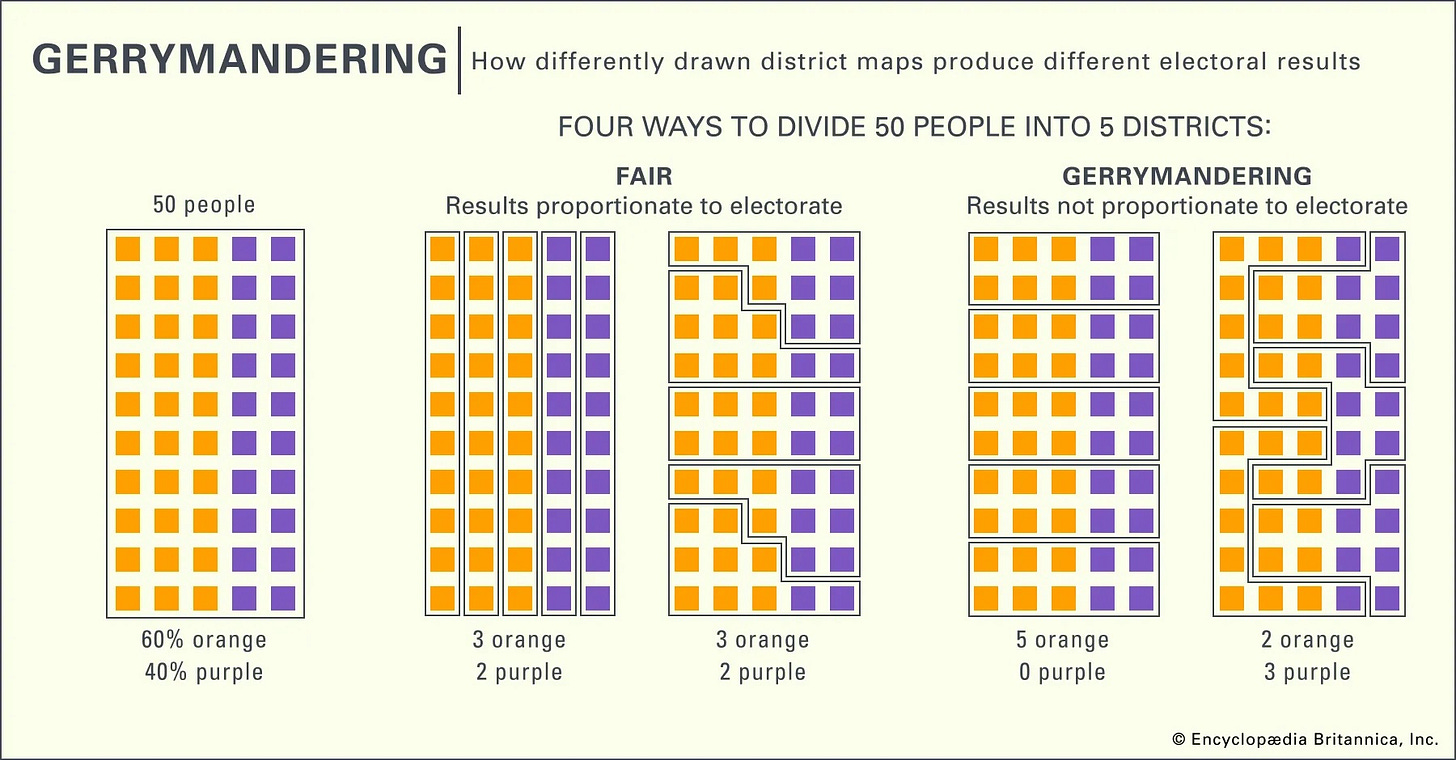Yes, even gerrymandering affects your personal finances
Minority rule means our government doesn’t provide the social services most Americans want
Just before Thanksgiving, I spent an evening watching the oral arguments before the Wisconsin Supreme Court in a case on gerrymandering, Rebecca Clarke v. Wisconsin Elections Commission, because I know how to have a good time.
Wisconsin’s legislative district maps are among the most gerrymandered in the country, skewed toward an unrepresentative Republican majority in our state legislature. The plaintiffs in the case aren’t making a partisan argument, but the partisanship of gerrymandering colors any case tackling election maps.
During one argument in favor of redrawing districts, conservative-backed Justice Brian Hagedorn asked the taunting question on many opponents’ minds: “What’s the acceptable range of Republican– or Democratic-leaning assembly districts or senate districts?”
Attorney Sam Hirsch responded with a succinct summary of the fight for fair maps: “The key question is Which maps are most likely to support, rather than thwart, majority rule?”
“In a year where Republican legislative candidates get more votes statewide than Democratic legislative candidates,” Hirsch continued, “they should control the legislature, and vice versa…It’s that simple, it’s called majority rule.”
This is the question at stake in gerrymandering cases, and our lack of majority rule is why these cases have been popping up around the country like weeds since the latest redistricting after the 2020 census.

The way the maps are drawn in Wisconsin, Democrats would have to get 61% of votes statewide to get a majority of seats in our state assembly, while Republicans would have to get just 44%. Until 2016, a small majority of Wisconsinites identified as Democrats, and now party identification is near 50/50. Yet, Republicans have held nearly two-thirds of the seats in our assembly for the past six elections, even when their candidates have failed to collectively get a majority of votes.
TL;DR: Most Wisconsinites agree with Democratic positions, but we’re being governed according to Republican ideology.
🚨 Update Feb. 2024: We have new maps in Wisconsin!!
This is more than a political fight
The fight for fair maps isn’t just kvetching from Democrats who don’t win elections. This isn’t about partisan power — it’s about electing representatives who’ll carry out the will of the people, as they’re tasked with doing. Our will isn’t carried out when the people in power aren’t the ones most of us voted for.
Because we’re here to talk about money, let’s talk about how the fight for fair maps is, among other things, about how our lack of small-d democratic representation impacts our relationships with money.
Without fair representation, our legislators aren’t implementing the economic policies people need — and want.
In a recent Pew Research survey, 73% of Americans were in favor of either maintaining or increasing government aid to the poor. Around two-thirds of Americans favored raising taxes on large corporations and high-income earners. Yet, Republican leadership in Congress continues to argue for reducing revenue and cutting services that help the poor.
While the Wisconsin case isn’t challenging U.S. Congressional districts, many others are. As of July 2023, cases in 29 states have launched to challenge congressional or legislative maps, and courts have already ordered new maps in Alabama, Alaska, Louisiana, Maryland, New York, North Carolina, Ohio and South Carolina.
Gerrymandering is about money, because fair maps give us true representation, and true representation is the only way we can be served fairly by our government.
When maps are skewed to create districts where Democrats don’t have a chance to win, Republican candidates in those districts don’t have to fight to earn votes. That means, once they’re in office, they don’t have to govern the way people want them to — and our government doesn’t serve us the way it should.
In Wisconsin, that meant cutting public education, despite an enormous store of money in the state. At the federal level, it’s meant calls for raising the retirement age and privatizing Medicare, and an end to the Child Tax Credit expansion that had lifted millions of children out of poverty.
Americans want policies that take care of us and the people in need around us. Those policies would have an enormous impact on your relationship with money and that of so many people around you who’ve been struggling unfairly.
We can’t get those policies until we fix the gerrymandered maps that oppress us under minority rule.
To learn more about gerrymandering and why this is such a big deal right now, read this fantastic overview from
at :🤔 Want to learn more about how our culture influences your relationship with money?
My Budget-Free Fundamentals series gives you everything you need to gain a fresh perspective on your relationship with money. In a few short lessons, you’ll gain tools to use money the way you want without relying on restriction, succumbing to shame or following advice rooted in greed. Paid subscribers have full access to this and all Healthy Rich classes.





Gerrymandering is in effect, cheating to win an election, and flies way under the radar for many voters. So glad you provided this explanation along with the nifty chart to help us visualize the unfairness.